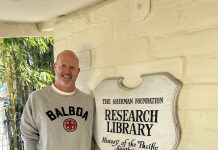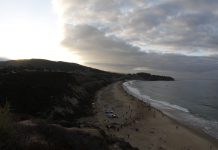Between now and election day, Nov. 2, we will be sitting down with each of the candidates for City Council to get some of their views via 10 Questions. We begin that effort this week with Councilwoman Nancy Gardner, who is running unopposed for a second term, representing the 6th District, which covers Corona del Mar and Newport Coast.
Gardner is the daughter of the late well-known Judge Robert Gardner, a founder of the local Surfrider Foundation, a businesswoman, and a longtime civic and environmental activist.
She was interviewed by Indy Editor Roger Bloom.
1. How green is Newport Beach?
When it comes to the ocean and bay, very green. We have invested a lot of money in projects, an example being the natural treatment system the city constructed along Newport Blvd. which captures runoff from Costa Mesa and removes pollutants before the water reaches the bay. We are picking up the pace in areas such as energy with new green building guidelines, LED streetlights and the like.
2. What would be your three main goals for a second term?
The council enunciates its objectives in January, and JWA is always at the top, but my particular focus will be 1) potable water–continuing to diversify our sources, to improve conservation, and to support efforts to develop a better statewide policy, 2) eel grass–convincing National Marine Fisheries that the proposal we have given them is scientifically sound so that the city can handle individual dock owners’ dredging permits. In return, we would insure a certain amount of eel grass in the harbor, 3) city government–finding new and creative ways to provide city services. Approached correctly, this can result in a better, more satisfying working environment and in improved services.
3. Some folks are questioning the scope and cost of the new Civic Center now under construction. What do think of those concerns?
We aren’t going to build something we can’t afford. We have built in opportunities all along the way to break out certain parts of the project if we feel the economic climate isn’t right. That being said, I think we would be remiss not to take advantage of the construction of a new city hall to create a civic center that will really be the center of our city in a way that a simple city hall can’t achieve–especially when the building climate is so favorable for us right now.
4. What is your favorite food? Why?
Apples. I have apple trees in my yard, and there is nothing like eating an absolutely fresh apple–particularly one with no pesticides.
5. Did you “step in it” with the proposed dogs-on-the-beach ordinance?
I don’t think so. I do think I was geocentric, thinking primarily of Big Corona and how empty it is when I run down there during the winter. I wasn’t thinking of the bay beaches, particularly Balboa Island, but I have no problem with excluding them if that’s what the Parks, Beaches and Recreation Commission recommends.
6. What is your opinion of the so-called “solar house” on Bayside, with the solar panels on the hillside?
I keep hoping to see landscaping that screens the panels from view. It’s hard to criticize people who are trying to be more energy efficient, but some of the Irvine Terrace hillsides have been beautifully landscaped, others have great rock formations, and to look at the panels instead–I understand why people are unhappy.
7. What is your favorite memory of your father?
Impossible to pick one, but lots are connected with bodysurfing: hanging out at Little Corona, going down to T Street or the Wedge on a big day. He got such a kick that I was the only girl in the water.
8. What do you see as the government’s proper relationship to the private sector in environmental matters?
There are some areas where the government must take the lead. The problem is so serious that it needs laws and compliance to handle it. For many issues, though, the best thing government can do is not get in the way, not create bureaucratic roadblocks that discourage people from changing the way they do things. Government can even encourage people with tax benefits, for example. Also, government should be the model–leading by example as the city is with its policy that all new city buildings have to be LEED certified or the equivalent.
9. What do you see happening with the Banning Ranch property?
The response from potential funders has not been encouraging. There seem to be two issues. The first is the cost. The general tenor is that it’s a lot of money for a small area compared to what you might get for the same money in a more remote area. We have suggested that saving open space in heavily urbanized areas is just as necessary and that although surrounded by affluence, there are also poorer neighborhoods nearby which justifies the cost in terms of environmental equity. This hasn’t seemed to resonate. The second reason given by funders generates from the first, basically, “Why should we spend all that money when you’ve got a developer willing to give you half.” So as far as funding, things are not very bright. That’s not to say the game is over. There’s an EIR coming up, Coastal Commission hearings, so things could change in terms of money.
10. What was the last CD you bought?
I am gradually rebuilding by record collection. I go to Second Spin, and the last CDs were The Essential Clash, Eric Clapton’s 461 Ocean Boulevard, and Leon Russell Retrospective.




